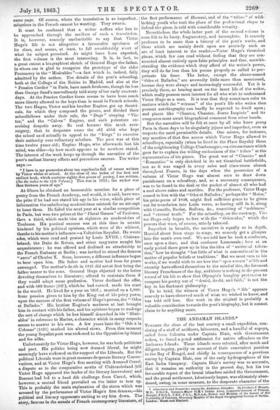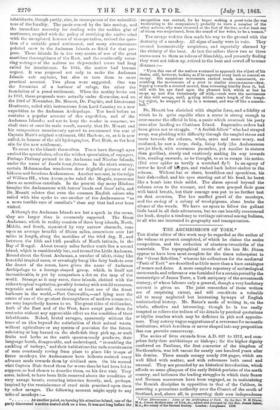THE ANDAMAN ISLANDS.*
TOWARDS the close of the last century a small expedition, con- sisting of a staff of artificers, labourers, and a handful of sepoys, sailed from Calcutta under Captain Blair, with Government. orders, to found a penal settlement for native offenders on the Andaman Islands. These islands were selected, after much and diligent inquiry, partly on account of their convenient position in the Bay of Bengal, and chiefly in consequence of a previous. survey by Captain Blair, one of the early hydrographers of the East India Company. Captain Blair's survey was so accurate,. that it remains an authority in the present day, but his too favourable report of the brutal islanders misled the Government,. and the penal settlement, laboriously begun, was ultimately aban- doned, owing, in some measure; to the desperate character of the * Adventures and Researchev among the Andaman Islanders. By Frederic J. Monett,. , M.D., F.R.C.S., Surgeon-Major H.M.a Indian Army, InspectonGeneral of Prisons, Bengal, F.RO.S., F.S.S., F.S.A., M.R.A.S., Fellow and Member of the Senate of lbw Uuivereity of Calcutta, Honorary Member of the Royal Geographical Society of Berlin. London : Hurst and Blacken.
inhabitants, though partly, also, in consequence of the unhealthi- ness of the locality. The panic caused by the late mutiny, and the immediate necessity for dealing with the sudden glut of mutineers, coupled with the policy of terrifying the native mind with the unexplored horrors of transportation, revived the ques- tion of a suitable penal settlement, and many circumstances pointed anew to the Andaman Islands as fitted for that pur- pose. These islands lie in the very centre of one of the great maritime thoroughfares of the East, and the continually recur- ring outrages of the naiives on shipwrecked crews had long called for interference. In 1855. the matter had become urgent. It was proposed not only to make the Andaman Islands safe asylums, but also to turn them to more practical account. Two plans were suggested. One was the formation of a harbour of refuge, the other the foundation of a penal settlement. When the mutiny broke out in 1857, these proposals were actually under discussion, and on the 23rd of November, Dr. Mouatt, Dr. Playfair, and Lieutenant Heathcote, sailed with instructions from Lord Canning on a new expedition to the Andaman Archipelago. The book before us -contains a popular account of this expedition, and of the Andaman Islands; arid not to keep the reader in suspense, we -shall state at once its main result, namely, that Dr. Mouatt and his companions unanimously agreed to recommend the seat of Captain Blair's original settlement, Old Harbour, or, as it is now called, in honour of the old hydrographer, Port Blair, as the bast site for the new settlement.
To come to the islands themselves. These have through ages -excited the speculation, often the wildest speculation, of voyagers. Perhaps Ptolemy pointed to the Andaman and Nicobar Islands, under the name of Insults bonte fortunx. In the ninth century, certain Mohammedan wanderers drew frightful pictures of the hideous and ferocious Andamanese. Another account, in the reign of William Ill., when Aurungzebe ruled the Moguls, represents them as merciless cannibals. In the present day many Hindoos imagine the Andamanese with horses' heads and lions' tails, and Dr. Mouatt relates that even the common English sailors who sailed with him spoke to one another of the Andamanese "as a more terrible race of cannibals" than any that had ever been visited.
Although the Andaman Islands are but a speck in the ocean, they are larger than is commonly supposed. The Great Andaman, which in reality consists of three long islands, North, Middle, and South, separated by very narrow channels, runs upon an average breadth of fifteen miles, somewhere over 140 miles in length, along the meridian of the 93rd deg. E, and between the 11th and 14th parallels of North latitude, in the Bay of Bengal. About twenty miles further south lies a second island, wkich is considerably less, and termed the Little Andaman. Round about the Great Andaman, a number of islets, rising like beautiful tropical oases, or seemingly hung like fairy baskets over the desert of the ocean, have given the name of Andaman Archipelago to a lozenge-shaped group, which, in itself not, inconsiderable, is yet by comparison a dot on the map of the world. Strange as it may seem, these islands, clothed with the richesttropical vegetation, possibly teeming with untold resources, vegetable and mineral, containing at least one of the finest harbours in the world,—Port Cornwallis,—and lying near the centre of one of the greatest thoroughfares of modern commerce, are very imperfectly known to us. The great tides of civilization, both of the East and of the West, have swept past them for centuries without any appreciable effect on the condition of their inhabitants. Naked, brutal savages, apparently without the trace of an idea beyond the satisfaction of their animal wants, without agriculture or any system of provision for the future, subsisting at hap hazard on the shell-fish they pick up, or such fruits and herbs as the earth spontaneously produces, their language harsh, disagreeable, and undeveloped, "resembling the cackling of turkeys," and their habitations the rude contrivances of men constantly roving from place to place like troops of fierce monkeys, the Andamanese have hitherto resisted every advance made towards them by civilized men. On his second visit Captain Blair found them far worse than he had been led to suppose, or had chosen to describe them, on his first visit. They seem, indeed, to have been little removed above the condition of very savage beasts, resenting intrusion fiercely, and, perhaps, inspired by the reminiscence of cruel raids practised upon them by other savages. The following account might apply to any tribe of monkeys :—
At another point, on turning his attention inland, one of the
4f
party discovered a native seated aloft on a tree. It was not long before the
recognition was mutual, for he began making a great noise (he was vociferating to his companions !) probably to warn a number of the other natives, who were observed at the foot of the tree, and at least one of whom was conjectured, from the sound of her voice, to be a woman."
The savage vedette then made his way to the ground with the dexterity of a monkey. All signs of amity were in vain. They seemed inconceivably suspicious, and especially alarmed by the vicinity of the boat. At last the sailors threw two or three cocoa-nuts to them as tokens of friendship, and presently finding they were not taken up, retired to the boat and rowed off to some distance :—
" Upon this one of the natives ventured to approach the object of his desire, still, however, looking as if he expected every bush to conceal an enemy. His suspicions movements excited much amusement, re- sembling the movements of a crow in similar circumstances—first, hopping towards a coveted morsel, then retreating timidly from it, but still with his eye fixed upon the pleasant bait, which at last he snips up and flies victoriously off with,—such were the movements of this wild savage, until, getting within arm's length of the tempt- ing object, he snapped it up in a moment, and was off like a cannon- ball."
Dr. Mouatt has sketched with singular force, and a fidelity of which he is quite capable when a scene is strong enough to over-master the official in him, a panic which overtook his party
soon after landing on Chatham Island. Imperative orders had been given not to straggle. "A foolish fellow" who had strayed away, was plodding with difficulty through the tangled stems and roots towards the column, when, more and more weary, and
confused, he saw a large, dusky, living body (the Andamanese are jet black, with enormous paunches, yet smaller in stature
than gorillas), slowly and cautiously making its way towards him, stealing onwards, as he thought, so as to escape his notice. (Did ever spider so terrify a wretched fly?) In an agony of terror he fired off hill gun, and rushed back helter-skelter to the column. Without hat or shoes, breathless and speechless, his hair dishevelled, and his eyes starting out of his head, he burst like a bomb into their midst. The alarm spread beyond the column even to the steamer, and the men grasped their guns with bated breath, but their courage was put to no further test on that occasion. The low muffled growl of the monkeys, and the cooing of a colony of wood-pigeons, alone broke the silence of the woods. We have no space to follow the gallant little band in all their adventures, but we can heartily recommend the book, despite a tendency to verbiage universal among Indians, to all who are interested in geography and transportation.































 Previous page
Previous page